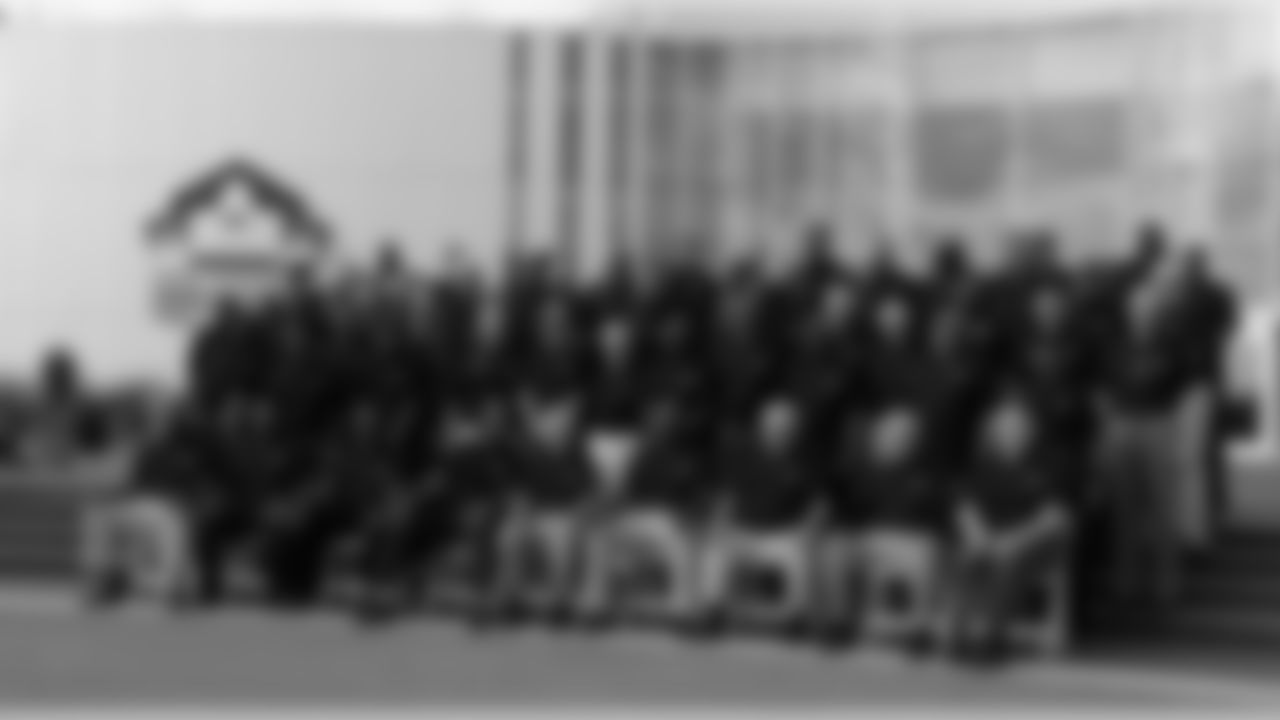**
What's the Hall of Fame selection process, and your role in it?**
"Each team — the Hall of Fame and the board of directors of the Hall of Fame will select a selector who covers each team. Usually their goal is to find a long-time media member — it can be broadcast, radio, newspaper, online — any platform, really. So there's one from each team, who covers each team, and there's several at-large members who are usually — they try to spread them out geographically so they're not all clustered from one area. That's the group that meets the day before the Super Bowl in the Super Bowl city each year. But through the year, we get a list of the players who have been nominated, either by fans, or the selectors, or from team officials — anyone can nominate an eligible player for the Hall of Fame and then we can get the initial list and then from that list, we vote. You can exchange information, you can send out anything you'd like the voters to see on candidates. And then from that original list, it goes to 25 and then there's a period of time and then, again, you can send out information, you can talk to voters, you can do whatever you like. And then that list goes from 25 to 15, and then the list of 15 is the one that is discussed face-to-face at the Super Bowl site."
Making those presentations, how would you classify that? Would you say it's like trying to 'sell' a guy or making a case?
Hall of Fame Broncos running back Floyd Little and two of his best friends and former teammates, Tom Jackson and Billy Thompson, toured the Pro Football Hall of Fame. (All photos by Ben Swanson)




















"I would never say 'sell,' because I think particularly if a player makes it to 25, there's a tremendous amount of support. You're not going to quote-unquote sell an undeserving Hall of Famer to, what, 40 — I think it's 48 — people on the committee now. You're not going to convince a body an undeserving player or someone who doesn't have the qualifications is Hall-of-Fame-worthy. At least that's my belief. I think what you do is try to present the whole story: all of the information that's available or what you or each voter himself or herself may have uncovered or an interview you've done with an opponent or an opposing coach — any of that information you want to get out to the other voters that you can."
Terrell Davis had been a Hall of Fame finalist and semifinalist for years before he made it in this year. Why do you think he 'broke through' this year, particularly with another great candidate in LaDainian Tomlinson making it, as well?
"I guess I've always been naïve enough to think that the committee could put in players, multiple players, from the same position. I understand there are only five slots for the modern-era finalists, so it does become mathematically interesting if you're going to put multiple players from the same position in, but I think each candidate of finalist has his own sort of process. I don't think each year that that group of finalists is lumped together, per se. I just think every guy has a story. And it's a tough process.
"It's not supposed to be easy; it's never going to be easy, and frankly, there's always going to be many, many more people who are deserving to be in the Hall of Fame than are actually in, just because of the numbers. I don't know that he broke through this year; I just think that he had been a finalist multiple times and the information keeps coming each year. Each year you give a presentation and other people say what they've heard, or what they've been told from other people they've talked to and I think just the information builds on itself each year for the guys who aren't sort of a proverbial first-time finalist who get in. That isn't the case for most.
"It takes many, many years for Hall of Famers to get in, just because the process is so tough. I don't know that he broke through, other than the committee heard the information and heard what was perhaps new this time around. Because as a presenter, you can't give the same presentation every year. I don't think that does a finalist a service. I think you've got to keep working to find as much information as you have, and if that means talking to more people, you do that. If that means looking at more game video, you do that. You do whatever — I just think, again, that you're not selling a guy, but as a person on the board of selectors, you owe it to these players and coaches and contributors to give it all your effort because it's an important thing to them. Who's to say they'll get back in the room as a finalist again? You can't leave [out] anything. They deserve to have their full case heard every time, no matter how many times they go in there.
"For a guy like Floyd Little who came in there as a senior candidate, he was only ever discussed in the room one time in all those years. It's an important day for people, and you've got to present and give as much information as you can or, frankly, you shouldn't be on the board of selectors."
Like Davis, Little had to wait a while to get the call, too. What kind of similarities were there in their cases?
"I think the senior pool is its own sort of dilemma. I'm on the senior committee and to see the list of names that have never been discussed or were never discussed when they were eligible as modern-era guys is staggering. There are many, many deserving Hall of Famers on that list who are going to continue to have to wait a long time to get in because of the process. So the seniors has its own set of issues.
"I think for Broncos fans and for probably even Terrell, the wait seems like a long time, but in comparison to many, many Hall of Famers like Rayfield Wright, for one, [or] Floyd Little — you look at those guys, they waited decades. So it's all a matter of perspective. I know every year you see the stories or hear the discussion about the quote-unquote travesty and who wasn't picked and who got passed over. It's a hard process. It doesn't go as quickly as anyone would like it to, but a lot of the people who have a lot to say about how long they've waited haven't really looked at how long some of the Hall of Famers waited themselves. In comparison, again, five years is going to seem like a long time to the player, but among all those guys that have gold jackets, many of them waited multiple decades. it's a tough thing. The Hall of Fame, the board of directors have picked this process. This is how they want it. They want it to be really hard to get in, and frankly, they've been successful."
Could you tell if any particular new information in Davis' presentation made an impact for him?
"I can't really say that there was just one nugget that was the difference. I think it's just the body, much like his career — I think it's the body of work finally is enough. I'm going on 20 years now on the committee and if the body of work is Hall-of-Fame-worthy, the guy goes in. it's a fact. Now, does he go in as fast as everybody would like? No, not all the time. And it's frustrating and everybody gets mad, but in the end, history has shown if the body of work is Hall-of-Fame-worthy, the player gets in and I think it was very clear the board of selectors said Terrell Davis' body of work is Hall-of-Fame-worthy."
Pat Bowlen's Hall of Fame candidacy has been a focal point for Broncos fans, too. What kind of chances do you think he has?
"It could take one [year]. I know he's been discussed, I know he has a lot of support, I know just from talking to the people on the board of selectors that I've spoken to that there's a tremendous amount of support for Pat Bowlen in the Hall of Fame. If you're asking me, do I think if he'll be in the Hall of Fame, I think, unquestionably, I do believe that myself.
Again, it's just a matter of working his way through the process. Every team and the fans of every team have five or six no-brainers, they think, for the Hall of Fame. Well, if you multiple that by 32, that's an awful big number and it's a lot more than the slots available every year. I know there's a lot of disappointment last year when Pat Bowlen was not among the two contributor finalists, but that doesn't mean people don't think he's a Hall of Famer. I think it could happen in the next couple years, even, if the discussion goes his way. It doesn't happen as fast as people would like almost ever, but if a person's body of work is Hall-of-Fame-worthy, it will be recognized as such. I believe that in almost every case. Now, the senior pool is proof it doesn't always happen, but I know the people on the board of selectors and everybody tries as hard as humanly possible to get the worthy Hall of Famers into the Hall of Fame."
You're also one of a handful of reporters who have been to the Scouting Combine each year since it was opened to the media. Why do you think it's become so popular as a spectator sport, particularly with the recent changes to add more fan involvement?
"Even 20 years ago there was some thought that if they would just put it on TV, more guys would work out because back in the day, it was very common for many of the top prospects to say they were not going to work out in Indianapolis because they either believed the track was slow and they wouldn't run a good time or they'd want to do it all in one shot. Whatever the reasons were, it was very, very common for many of the top people not to work out, and even then the feeling was if you just put it on TV or something, guys will work out because they'll want to show what they can do. And I think that little aspect of it has always been in the back of people's minds in the league. And also it can generate revenue, they've discovered. People are interested in the draft and it's programming the league and you put all that together, it gets good ratings. So people are going to do the math and say, 'Well, I bet we could sell tickets to that,' and that's kind of exactly what's happened. They're going to make it an event. There's still some scouting going on, but it is a lot bigger of an event. I mean, when I first started going, an awful lot of people in Indianapolis didn't even know it was going on. it was kind of a secret convention every year that you could go mingle at, and not very many people knew."
How much scouting value is there at the Combine?
"I always tell people the drills were created because each of them has one aspect of athleticism that teams would like to see. Whether it measures explosiveness or quick-twitch reaction time or ability to change direction, they all serve a purpose. It's not football, it's not the whole equation, but just like it would be silly to ignore a guy's game video, it would be silly to ignore what he can do in drills in a controlled environment when you can time every guy over the same set of circumstances. It's how you can compare people. I think ultimately scouting is breaking ties. You've got to move people up and down the board and to do that, you've got to break ties and you have to have a way to break ties — some kind of information, whether it's off the field, on the field, if it's how he ran a drill, if it's a gut feeling. I know it's kind of in vogue to make fun of it and the shorts and t-shirts and all that, but they started doing those drills 30, 35 years ago for a reason and they still do them for the same reasons, and if people choose to sort of shove those aside or ignore them, I don't think they're always going to get the scouting report they want. It's not the whole story, but it's part of a story and as evaluators, their jobs is to get as much information as possible. It's part of the deal."













